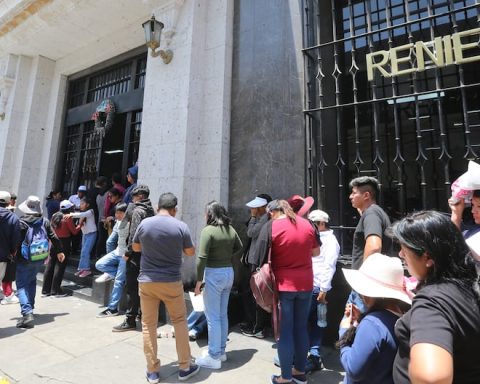Marta Lagos, founder of Latinobarómetro and MORI Chile, maintained that from 2015 onwards the way in which governments are seen changed. In her opinion, along with pointing out that “the ministers, except for a very few, are not known”, the cabinets “stop playing the role they played before 2010”.
According to the pollster, people expect results in their daily lives, and the ministers “are not the actors, but the public policies.” In this sense, she affirmed that this cabinet change clearly has “a sense of management” for the President, especially since he changed a significant number of undersecretaries who are the ones who “manage” the ministries.
You may also like:
Marta Lagos valued, of course, the change in the Foreign Relations portfolio, which in her opinion “God knows that it is due to errors that also occurred at the presidential level”, and where the thread “is cut at the thinnest”. Albert Van Klaveren, he assures, “he is a gigantic professional and he will be a great chancellor”.
“The rest of the new ministers are neither the most important politicians nor the best known. It is more about an adjustment by the President in his management,” reiterated the analyst, for whom it is also interesting that so many independents are appointed.
“The change of cabinet is, at the end of the day, a spring of the elite for the elite, while people ask themselves: ‘and what changes for me?’, questioned Marta Lagos, together with the following reflection: “Today the Peoples look for solutions to problems, everything else is irrelevant, that’s why politics is so on the ground. Here too much importance is given to things that are not important to the people.”
“The government of together, but separated” is over
Meanwhile, according to Noam Titelman (RD), an economist at the PUC and adjunct researcher at the Center for Public Systems at the University of Chile, the cabinet change “is one more step to overcome the divisions between the two coalitions.”
“Already in the previous cabinet change it became clear that this was a government of two coalitions with equal participation. It was noted with the political committee and the incorporation of Ana Lya Uriarte and Carolina Toha. But with this change, especially at the level of undersecretaries and seremis, the government of ‘together, but separated’ is over,” also stated the director of the Foundation for Overcoming Poverty and a master’s degree in Social Research Methods from the London School of Economics and Political Science (LSE).
According to Titelman, “in various work teams there will be people from all the diversity of parties.” In addition, he emphasized that the ministerial adjustment occurs at a time when it is very important to “have a tidy house.”
“The President’s call to ‘dialogue until it hurts’ reflects how important it is to build a political majority that can carry out urgent reforms, such as the tax reform. And to build bridges to the outside, the first thing is to have well-consolidated bridges to the inside,” added the former president of the PUC Student Federation and member of the Red de Estudios para la Profundización Democrática (RED) Foundation.
“We are going to continue with a government trapped in its contradictions”
On the other hand, with a more critical tone, the researcher at the Institute for Society Studies (IES), Pablo Ortúzar, remarked that this change of cabinet “does not reflect a political decision regarding the new direction of the government.”
According to the social anthropologist, writer and academic, the government of President Boric “still hasn’t completely given up on the brutal defeat in the September 4 plebiscite.”
He said that with the ministerial adjustment “there is a readjustment that continues to be divided between political forces where some appear clearly overvalued.”
“We are going to continue, then, with a government trapped in its contradictions, with someone else’s hand syndrome: inviting dialogue, hitting the table, asking for help in a haughty tone and drawing ridiculous minutes to blame everything on anyone other than themselves”, questioned Ortúzar.
At the end of the day, the analyst lashed out, “it seems that the new left does not have the intellectual or political fortitude to correct the course in an honest and determined way.” So instead, he said, “they have decided to lurch, aimlessly.”
In any case, he concluded, and beyond everything said, he considers the departure of former Undersecretary Ahumada to be great news. “He managed to be the worst of the bad in government.”
communication errors
Claudio Salinas, an academic at the Faculty of Communication and Image of the University of Chile (FCEI Uchile), points out two things that, in his opinion, are communication errors: the expectation generated around the change of cabinet and the tone that he considers ” before the feminist revolt and the social outbreak”.
The also coordinator of the Master’s in Political Communication at Casa de Bello, affirms that it has been negative “generating an event with the change of cabinet and that the days go by, generating expectations”, since “it leaves many days of accumulation of opinion, both public and the political forces of the opposition”.
“The change of cabinet, as it has been going on for a long time, what appears in the media scenario is that it is a matter of balancing forces between the different components of the government coalition”, he states, however he states that “it is more about a political division”. This, for Professor Salinas, is another “communication error.”
The FCEI academic comments that, especially with what happened in the Ministry of Cultures, after the appointment of Jaime de Aguirre as head of the portfolio“it gives the impression that the composition of the ministries is closer to something that predates the feminist revolt and the social outbreak.”
Basically, he explains, “the change of cabinet is a kind of proof, as is the expansion of the adjustment, that there is a kind of restoration towards a world prior to October 18”.
“I think that the change of cabinet, about which we are worrying so much, is something that is not being done well, especially in communication,” Salinas maintains, criticizing that the “event” is the change of cabinet and not, for example, that inflation was lower than expected even by all right-wing economists and that in many other areas new things have been achieved that have not been able to be installed on the public agenda.
“The scenario is complex for the Government. It is stepping on the opposition’s stick and with the dilation it makes public opinion pay attention to things that are not so relevant,” he concludes.


















